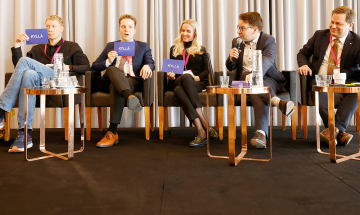
Technology Industries of Finland: Two thirds of technology industry companies report a drop in new orders
This information is based on the recent order book and personnel survey published by Technology Industries of Finland.
“The results of the survey indicate that there is a downturn as well as uneven development between sectors and greater divergence between companies. It is also important to note that the value of export orders in mechanical engineering, which is the largest technology industry sector in Finland, has dropped for three consecutive quarters now,” says Petteri Rautaporras, Chief Economist at the Technology Industries of Finland.
While the monetary value of new orders in technology industry was 8 per cent higher than in the preceding quarter, this is due to a few large orders. Without these, the value of new orders would have dropped notably and order books would also have taken a turn for the worse.
The notable drop in the number of requests for tender also signals that the market is slowing down. The balance figure that measures the level of tender requests has been lower than the current figure (-17) only once in the past decade, and that level was reported for a quarter during the euro crisis. Judging from the number of tender requests, order development in the remainder of 2019 and the coming winter is expected to be weaker than in recent months.
“Considering the prevailing global uncertainty, slowdown in important export destinations and an increased likelihood of a downturn in Finland, this comes as no surprise. The survey results do not indicate a sudden collapse, but the trend has reversed and the downward drop is a cause for concern. Alarm bells are ringing,” Rautaporras says.
Nonetheless, order books in the industry remain at a good level after years of growth. The value of order books remained more or less steady during the July-September period due to a few large orders, and was 10 per cent higher than twelve months earlier. However, it is important to note that some 60 per cent of the strengthening of the order books in the past 6 years is attributable to ship orders.
Decision-makers need to act now
According to the CEO of the Technology Industries of Finland, Jaakko Hirvola, the survey results should be a wakeup call for all decision-makers. It is high time to see that we cannot escape the problems in the global economy, which are beginning to have an impact on the Finnish export sector and people’s everyday lives.
“Important decisions are needed without delay. Even if the necessary political decisions to support employment and growth are made, they will need time to take effect. If the decision-makers want to support employment and business investment, they should act now as the outlook is weakening,” Hirvola emphasises.
According to Hirvola, businesses also expect to see coherency and consistency. To be able to make investment decisions under challenging conditions, businesses must be able to rely on the availability of skilled employees on the long term, competitive tax policy and continued support for the development of expertise. Consistency is of utmost importance.
“The problem of matching demand and supply and the need for labour immigration have been talked about for years. It is time to move from discussion to quick decisions and implementation. According to the Ministry of Economic Affairs and Employment of Finland, there are currently more than 100,000 vacancies despite high unemployment. Skills shortage is a major obstacle for growth, and does not help Finland’s case in terms of investment decisions,” Hirvola points out.
Cost competitiveness is increasingly important
According to Minna Helle, Director, Labour Market at the Technology Industries of Finland, the weakening outlook comes as no surprise to the parties of the ongoing labour market negotiations. In a situation like this, cost competitiveness becomes increasingly important so that companies can win deals on a contracting global market.
“Improved cost competitiveness is the central objective of technology industries. Working time is a factor, and all parties should be proactive and work together to find a solution. Considering the increasingly bleak outlook, reducing working hours would not be a desirable outcome, because it would weaken companies’ competitiveness and potential for creating jobs,” Helle states.
Helle also points out that the decisions on working time and wages are linked and longer working times creates room for wage increases. If the working time extension agreed in the Competitiveness Pact were to be withdrawn, this would mean smaller wage increases. This in turn would have a negative impact on purchasing power.
The cost effect of extension in working time is calculated to be 1.4 percent in technology industries.
“Social partners’ responsibility for the development of employment and economy is significant. We aim to continue the negotiations in a solution-oriented manner,” Helle emphasises.
Further information:
Jaakko Hirvola, CEO, phone +358 40 063 3751
Minna Helle, Director, Labour Market, phone +358 40 341 4884
Petteri Rautaporras, Senior Economist, phone +358 40 304 2220



